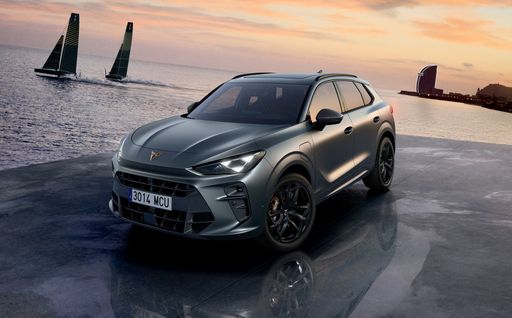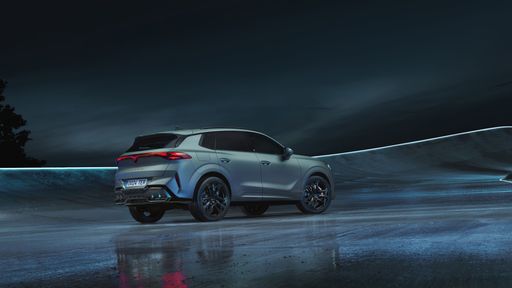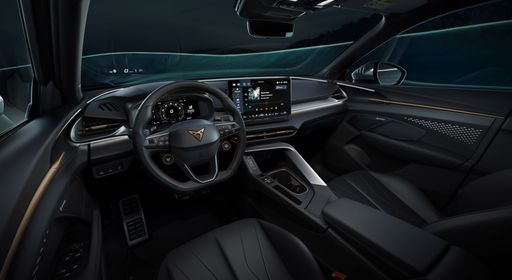CUPRA Terramar vs Hyundai Tucson - Differences and prices compared
Compare performance (272 HP vs 288 HP), boot space and price (36900 £ vs 20900 £ ) at a glance. Find out which car is the better choice for you – CUPRA Terramar or Hyundai Tucson?
Costs and Efficiency:
Price and efficiency are often the first things buyers look at. Here it becomes clear which model has the long-term edge – whether at the pump, the plug, or in purchase price.
Hyundai Tucson has a clearly advantage in terms of price – it starts at 20900 £ , while the CUPRA Terramar costs 36900 £ . That’s a price difference of around 15977 £.
Fuel consumption also shows a difference: CUPRA Terramar manages with 1.60 L and is therefore convincingly more efficient than the Hyundai Tucson with 2.70 L. The difference is about 1.10 L per 100 km.
As for electric range, the CUPRA Terramar performs decisively better – achieving up to 118 km, about 48 km more than the Hyundai Tucson.
Engine and Performance:
Power, torque and acceleration are the classic benchmarks for car enthusiasts – and here, some clear differences start to show.
When it comes to engine power, the Hyundai Tucson has a slight edge – offering 288 HP compared to 272 HP. That’s roughly 16 HP more horsepower.
In acceleration from 0 to 100 km/h, the CUPRA Terramar is clearly perceptible quicker – completing the sprint in 5.90 s, while the Hyundai Tucson takes 7.50 s. That’s about 1.60 s faster.
In terms of top speed, the CUPRA Terramar performs somewhat better – reaching 243 km/h, while the Hyundai Tucson tops out at 204 km/h. The difference is around 39 km/h.
There’s also a difference in torque: CUPRA Terramar pulls hardly perceptible stronger with 400 Nm compared to 379 Nm. That’s about 21 Nm difference.
Space and Everyday Use:
Beyond pure performance, interior space and usability matter most in daily life. This is where you see which car is more practical and versatile.
Both vehicles offer seating for 5 people.
In curb weight, Hyundai Tucson is barely noticeable lighter – 1542 kg compared to 1638 kg. The difference is around 96 kg.
In terms of boot space, the Hyundai Tucson offers a bit more room – 620 L compared to 540 L. That’s a difference of about 80 L.
When it comes to payload, Hyundai Tucson minimal takes the win – 545 kg compared to 542 kg. That’s a difference of about 3 kg.
Who comes out on top?
Overall, the CUPRA Terramar shows itself to be wins the duel decisively and secures the title of DriveDuel Champion.
It convinces with the more balanced overall package and proves to be the more versatile choice for everyday use.

CUPRA Terramar
Costs and Consumption
View detailed analysis
Engine and Performance
View detailed analysis
Dimensions and Body
View detailed analysis
CUPRA Terramar
The CUPRA Terramar is a sharply styled, sporty SUV that brings athletic handling and bold design to buyers who want performance with everyday usability. Inside, premium finishes meet driver-focused flair and family-friendly practicality, making it a tempting pick for anyone who wants thrills without turning their daily routine into a chore.
details


Hyundai Tucson
Hyundai Tucson marries bold, sculpted looks with a clever, roomy cabin that feels smarter than its price tag suggests. It's composed on the road, easy to live with day-to-day, and a sensible choice for buyers who want SUV style without the showroom theatrics.
details




Costs and Consumption |
|
|---|---|
|
Price
36900 - 50600 £
|
Price
20900 - 47900 £
|
|
Consumption L/100km
1.6 - 8.4 L
|
Consumption L/100km
2.7 - 7.6 L
|
|
Consumption kWh/100km
-
|
Consumption kWh/100km
-
|
|
Electric Range
118 km
|
Electric Range
63 - 70 km
|
|
Battery Capacity
-
|
Battery Capacity
-
|
|
co2
36 - 191 g/km
|
co2
62 - 172 g/km
|
|
Fuel tank capacity
55 - 60 L
|
Fuel tank capacity
52 - 54 L
|
Dimensions and Body |
|
|---|---|
|
Body Type
SUV
|
Body Type
SUV
|
|
Seats
5
|
Seats
5
|
|
Doors
5
|
Doors
5
|
|
Curb weight
1638 - 1904 kg
|
Curb weight
1542 - 1893 kg
|
|
Trunk capacity
450 - 540 L
|
Trunk capacity
546 - 620 L
|
|
Length
4519 mm
|
Length
4525 - 4535 mm
|
|
Width
1869 mm
|
Width
1865 mm
|
|
Height
1586 mm
|
Height
1650 mm
|
|
Max trunk capacity
-
|
Max trunk capacity
1795 - 1799 L
|
|
Payload
512 - 542 kg
|
Payload
518 - 545 kg
|
Engine and Performance |
|
|---|---|
|
Engine Type
Petrol MHEV, Petrol, Plugin Hybrid
|
Engine Type
Petrol, Full Hybrid, Plugin Hybrid, Diesel MHEV
|
|
Transmission
Automatic
|
Transmission
Manuel, Automatic
|
|
Transmission Detail
Dual-Clutch Automatic
|
Transmission Detail
Manual Gearbox, Dual-Clutch Automatic, Automatic Gearbox
|
|
Drive Type
Front-Wheel Drive, All-Wheel Drive
|
Drive Type
Front-Wheel Drive, All-Wheel Drive
|
|
Power HP
150 - 272 HP
|
Power HP
136 - 288 HP
|
|
Acceleration 0-100km/h
5.9 - 9.3 s
|
Acceleration 0-100km/h
7.5 - 11.6 s
|
|
Max Speed
205 - 243 km/h
|
Max Speed
196 - 204 km/h
|
|
Torque
250 - 400 Nm
|
Torque
250 - 379 Nm
|
|
Number of Cylinders
4
|
Number of Cylinders
4
|
|
Power kW
110 - 200 kW
|
Power kW
100 - 212 kW
|
|
Engine capacity
1498 - 1984 cm3
|
Engine capacity
1598 cm3
|
General |
|
|---|---|
|
Model Year
2024 - 2025
|
Model Year
2025
|
|
CO2 Efficiency Class
E, G, F, B
|
CO2 Efficiency Class
F, D, E, B
|
|
Brand
CUPRA
|
Brand
Hyundai
|
What drivetrain options does the CUPRA Terramar have?
The CUPRA Terramar is available as Front-Wheel Drive or All-Wheel Drive.




